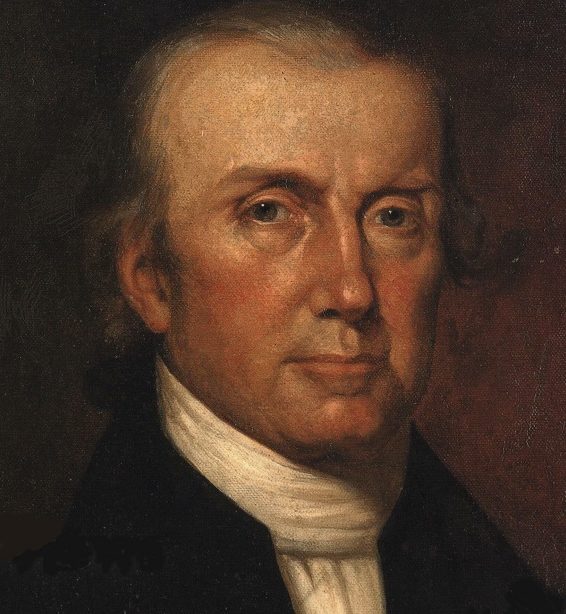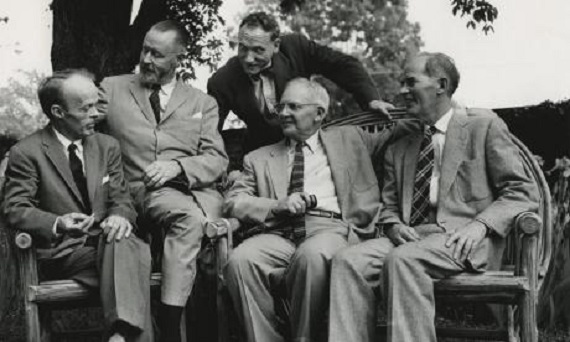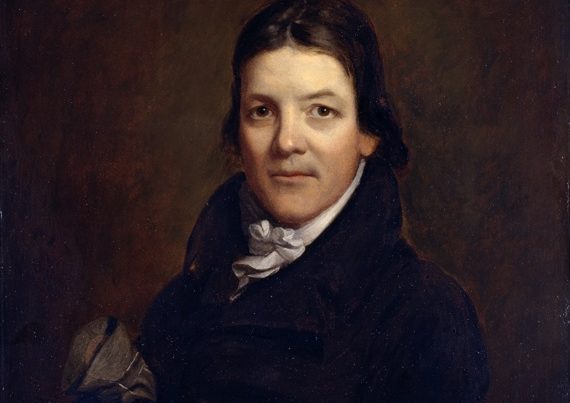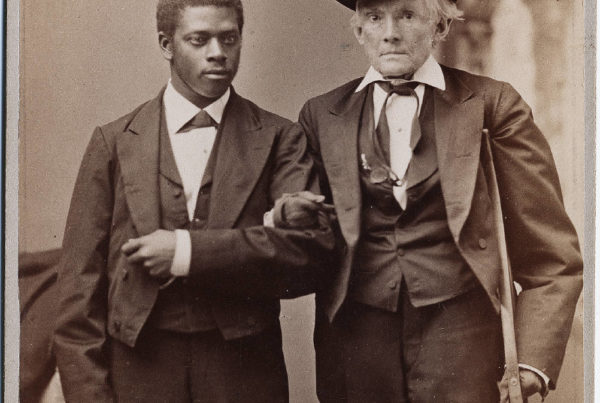We now approach the heart of Taylor’s Inquiry: recent times had created a new type of privileged order exercising dominion in a new way. This was the “paper and patronage aristocracy,” a form of government that had been perfected by England. John Adams had completely failed to notice the new type of regime (although, in fact, he actually wrote most of his Defense in England) and admired British government for the checks and balances he imagined it embodied. The new type of privileged order, on the other hand, was what Hamilton understood well and admired. The economic policies which the Federalists promoted (like “Funding”) were presented as morally required (“publick faith and credit”) and socially beneficial. Hamilton had actually declared that “a public debt is a public blessing,” that the government paying interest to the wealthy was somehow a good and necessary thing. To an honest farmer like John Taylor, whose livelihood came out of the soil, it all amounted to “the most unblushing corruption.”
The new privileged order of ” paper and patronage” did not rest upon force and superstition or on real services that had sometimes even justified aristocracies. It’s basis was fraud—promotion of the belief that its depredations constituted a public benefit. The new aristocracy profited by the control of government paper in two major ways. It loaned the government money at high interest and with no risk (“Funding”). Secondly, it received from the government banking privileges which gave it virtual control of the currency supply which it could expand or contract to its own benefit. Both were frauds. The first was unnecessary because the government was merely loaning out its credit for private profit when its own revenue provided sufficient funding without issuing bonds in which the wealthy could get a permanent claim on the Treasury (and thus on the taxpayers). In the second case government abrogated its responsibility for the currency and undermined the discipline of a metallic standard by supporting private interests in passing off their paper as money.
The interest on the debt could only be paid by taxation on the producers of real wealth out of the earth, who also lost to the banking interest by inflation. There were, as well, other clever tricks in the bag of the paper and patronage aristocracy for making money for the few at the expense of the many: direct bounties to certain industries (like the New England fisheries) or indirect bounties by tariffs that excluded competing imports. The whole program was presented with superficial plausibility as a national necessity and of universal benefit. Henry Clay called it “The American System”; Lincoln was to call it “Free Labor.” As Taylor saw the world, the English system was being fixed upon America and the opportunity won by the Revolution thrown away. Besides elitism, there was also an element of sectional aggression in the Federalist program that became ever more apparent as the 19th century developed—the profits headed North and the costs headed South.
American society was not divided, as in John Adams’s fantasy, into the wealthy, talented, and virtuous and the democratic masses whose depredations on their betters had to be controlled by government. Rather the real division was that between, as Calhoun phrased it less than twenty years later, the taxpayers and the tax consumers. Or in Taylor’s words: the people were divided by government action into “those who lose property and those who receive it.” After all, the plain folk, as well as the rich, had property to protect.
This system of profit by manipulation of government privilege through the mysteries of finance, presented as somehow an addition to the sum of national happiness, inevitably wed the “paper” aristocracy to the “patronage” aristocracy. This was the ever-increasing constituency that lived on government payroll and government contracts. Since the patronage was in the control of the executive, the natural consequence was “monarchy,” perfectly exemplified by the English king, whose ministers used patronage to control the Parliament for the benefit of the privileged order.
Taylor the agrarian conservative suffers no confusion about a conflict between freedom and property. (Property for him includes the earnings of labor.) The security of property—real property, not government benefits—is for him the very definition of liberty. Private property defenseless against inevitably predatory rulers is the very definition of slavery. We need to understand here Taylor’s use of the term “aristocracy.” He means the term in a precise political sense. By “aristocracy” he does not mean a person of good birth and honourable behaviour like himself and his Virginia compatriots. He means a class that enjoys an unearned monopoly of wealth through privileges granted by government. Taylor would not have disagreed with Jefferson on the existence of a “natural aristocracy” which is a boon to the commonwealth. It is a curious and little remarked upon fact of the American foundational period that genuine aristocrats of the South like Taylor and Jefferson favoured the people, the smallest possible tax burden, and a simple and inexpensive government. Northern leaders with much less claim to the title of “aristocrat” feared “the mob” and sang praises to a government of the elite. While John Taylor lived at ease among his seventy slaves, Vice-President John Adams was fortifying his house in fear that the American rabble, inspired by the recent example of the French, might at any time attack their betters.
Does the 21st century American regime represent a paper and patronage order that grants unearned wealth and power to itself through government privilege and public office and subsidy? An order that is widely believed to be socially beneficent but is really an unjust subtraction from the sum total of national happiness? How one answers this question will to a considerable extent determine how much value is placed upon John Taylor of Caroline and his Inquiry into the principles and policy of American government.
Another Federalist work that Taylor condemns, though not as often as Adams’s, is John Marshall’s Life of George Washington (5 vols., 1804–1807), the source of misconceptions that have become embedded in concrete in American historiography. Marshall portrayed the years after the Revolution as a dangerous period of anarchy and near-civil war between debtors and creditors. It was a “critical period” in which tumultuous mobs and uninhibited popular majorities threatened the sanctity of private property and thus the foundations of civil society and good order. This grave danger had been averted only by the wise leaders who had designed the Constitution and forced through its adoption. They had given Americans what they needed, particularly a strong federal government with sound “publick credit” and the “sanctity of contracts.”
To Taylor and friends, and to many historians later, this characterization of the period was greatly exaggerated. As they saw it, enshrining “sanctity of contract” unnecessarily in the federal Constitution had been a ruse for profit-making ventures. It allowed the speculators who had bought up the Revolutionary debt at cents on the dollar to be paid off, under Hamilton’s “Funding” plan, at face value in interest-bearing government bonds. And it had justified such abominations as the Supreme Court ruling in Fletcher v. Peck (1810). This was the Yazoo land business which Taylor’s ally Randolph never tired of bringing up when he had the floor in Congress, no matter what subject was under discussion. In that case the Court ruled that “sanctity of contract” prevented a state legislature from repealing a notoriously corrupt bestowal of benefits on private persons by its predecessor. In other words, the federal judiciary had asserted the right to overrule the sovereign people of a State based on its interpretation of a few words in the Constitution. And had done so to protect capitalists who had bribed their way into stealing an immense amount of property from the people.
Marshall’s work was responsible for yet another long-standing misreading of Revolutionary history. As Marshall portrayed it, officers who had played an active fighting role in the War of Independence naturally became advocates of a strong central government, having seen the inadequate support given to the soldiers by the Continental Congress during the war. It was implied that the hope for a strong central government had been the source of the sacrifice and gallantry of the war itself. This was certainly true of Marshall and Hamilton, but the generalization is false. It was not true of fighting soldiers like Taylor, James Monroe, and St. George Tucker of Virginia, Nathaniel Macon of North Carolina, Thomas Sumter of South Carolina, and James Jackson of Georgia, all of whom saw the Revolution as a struggle against a strong central power. And who, in several cases, died regretting that the United States government had become a greater threat to liberty and property than Great Britain had been.
In An Inquiry deals only slightly with that other piece of centralist propaganda, The Federalist. He saves the demolition of that work for Construction Construed.
Randolph of Roanoke is said to have remarked that Taylor’s works would be very effective if someone could be employed to translate them into English. There is other contemporary commentary to the same effect. Indeed, Taylor’s literary style has been a problem for most commentators and an insurmountable obstacle for some. This criticism is somewhat exaggerated. Taylor writes as a man of the 18th century, like Samuel Johnson or David Hume. He is addressing his fellow citizens in serious but leisurely conversation that requires a commitment of time and close attention. He communicates his understanding modestly, as one gentleman to another, only slightly influenced by the rising romanticism of his time and not influenced at all by the Germanic style of scholarly specialization that took over political philosophy in the mid-19th century and which governs the expectations of modern readers. He is not an intellectual historian creating a chain of references (which John Adams often seems) but a citizen applying reason to vital questions of the day. He is not expounding a theoretical system but defending a real living society.
Actually, Taylor has two styles, the philosophical, which predominates in An Inquiry, and a more playful front-veranda conversational style that very much anticipates the Southern story-tellers who are major literary figures of the 20th century. Traces of this style appear now and then in An Inquiry, but it is most evident in Arator and qualifies Taylor as an early example of Southern literature as well as a political philosopher.
The Constitutional scholar James McClellan compared reading Taylor to a treasure hunt. Indeed, there are nuggets of gold shining here and there through out An Inquiry. There are rather delightful flashes of aphorism and not infrequently humour as when Taylor explores the real meaning of such aristocratic frauds as “publick faith and credit,” which really means allowing the rich to loan money to the government risk-free at high rates of interest.
A few samples of Taylor’s comments on “paper and patronage” morality and economics will give the flavour:
A crocodile has been worshipped, and its priesthood have asserted, that morality required the people to suffer themselves to be eaten by the crocodile.
But an opinion that it is possible, for the present generation to seize and use the property of future generations, has produced to both the parties concerned, effects of the same complexion with the usual fruits of national errour. The present age is cajoled to tax and enslave itself, by the errour of believing that it taxes and enslaves future ages to enrich itself….
Inferior agents in all wicked plots suffer punishment in this world, whilst their leaders often avoid it until the next.
Had Sancho [Panza in Don Qixote] known of a paper stock system, he would not have wished for the government of an island inhabited by negroes. Has Providence used this system to avenge the Africans, upon the Europeans and Americans?
…a power in a government of any form, to deal out wealth and poverty by law, overturns liberty universally; because
it is a power by which a nation is infallibly corrupted….
A legislative power of regulating wealth and poverty, is a principle of such irresistible tendency, as to bring all political parties to the same standard…..
It is strange, that it is so difficult to distinguish between honest and fraudulent taxes, imposed by a minor interest on the publick interest….
There is edification and safety in challenging political words and phrases as traitors, and trying them rigourously by principles, before we allow them the smallest degree of confidence. As servants of principles, they gain admission into the family, and thus acquire the best opportunities of assassinating their masters, should they become treacherous. The useful and major part of mankind, comprised within natural interests (by which I mean agricultural, commercial, mechanical, and scientifick; in opposition to legal and artificial, such as hierarchical, patrician, and banking) is exclusively the object of imposition, whenever words are converted into traitors to principles.
As the samples suggest, the power of Taylor’s thought is best appreciated by leisurely contemplation rather than hasty reading. This doubtless made his works less influential than they might have been as did another factor—their desultory and untimely publication. Taylor had begun publicizing the evils of the Hamiltonian coup in the 1790s with a number of pamphlets. Always a busy farmer and often, at the importuning of Jefferson and others, reluctantly active in public office, he took his time in composing and in bringing his work to press. An Inquiry was apparently written during 1802–1805, put aside for some time, then revised and published in 1814. Much of it is in reply to John Adams’s treatise first published in 1787. His two books published in 1820 and 1823 were partly in response to the unfolding usurpations of the Marshall Court, but also replies to The Federalist of 1787. Madison’s administrations had by 1814 provided Taylor with a new motive for reaching the public: the evil moral principles of Federalism had made a lodgment in the party of Republicanism.
The teachings of a prophet rise and fall in value according to the perceptions of those who receive them. For some Taylor will always be a negative and pessimistic voice for outmoded ideas—an opponent of the American spirit, detractor from the American success story and, worst of all to the 21st century, a defender of antebellum slavery. Others will find that his prophecy resonates with proper warnings for our own time, making him once more a thinker of interest. Were Taylor with us he might feel justified indeed in pointing out that the “consolidation” of national power has had a greivous downside.
He would vigorously question whether the people’s liberty and sovereignty are secure in today’s regime and indict us for having permitted a progressive betrayal of the true moral principles of American government. He would doubtless make a catalog of the signs: A permanent standing military force, consuming immense resources and exercising a powerful role in society, though little of it relates to actual national defense. Government debt soaring beyond the bearing of society and imposing an impossible burden on the wealth of future generations, profiting some few interests (although he could never have imagined that most of the “paper aristocracy” would be foreigners). A President becoming more and more “monarchical” in power, unchecked by the other branches of the government, the States, or the people; indeed, the presidency and other public offices coming to be more and more de facto hereditary. Officials distant from the people and immune to the laws they make for others. A Supreme Court that has acquired sole possession of the Constitution, and thus assumed sovereignty over the people, issuing decrees that are “the supreme law of the land” though violating law, tradition, truth, consistency, common sense, morality, and the plain sense of the Constitution’s words.
Taylor’s list of the betrayal of correct moral principles of government could go on for a long time. We can perhaps understand his point of view when we remember how he defined those correct principles: “to prevent the introduction of force by armies, and fraud by corruption; and to secure an allegiance of the government to the understandings of the people, and not an allegiance of the people by force or fraud, to the will of the government.”






